Alumni Grantees: Class of 2013
- By The FruitGuys Community Fund
- Reading Time: 6 mins.
In the Community Fund’s first year of operation, we gave nearly $20,000 in grants to five farms and agricultural nonprofits in California and Pennsylvania. Here are some updates on how their projects went.
2013 Grantees
New Family Farm in Sebastopol, CA; Red Heart Ranch in Finley, CA; Snipes Family Farm & Education Center in Morrisville, PA; SAGE Ag-Park in Sunol, CA; Two Gander Farm in Downingtown, PA
- New Family Farm in Sebastopol, CA, received a $3,500 grant to purchase a new manure spreader, to more efficiently fertilize the soil.
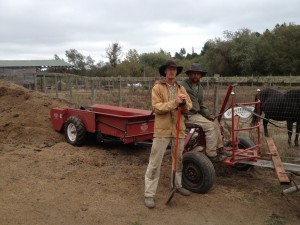
August 2013 update
After extensive research into horse-drawn manure spreaders manufactured by Amish companies back East, we decided to purchase a ground-driven pull-behind spreader (this means that the turning wheels power the equipment) made by Mill Creek through our local tractor supply company in July 2013. In so doing we saved over $1,000 on shipping. Additionally, should new parts or repairs become needed, the supplier is just one town away. We hitch the spreader to our fore-cart which our horses pull. We have noticed a richer, darker texture to the soil where we have spread. We have so much manure that we can apply it very generously. So far the system is working great.
- Red Heart Ranch in Finley, CA, received a $5,000 grant to install solar-powered irrigation and build a hoop house.
Want farm-fresh fruit?
We've got you covered.May 2013 update
Well, thanks to a grant from The FruitGuys Community Fund, we are going to be able to make huge improvements in our irrigation system. We are going “off-grid” and will be using 100% solar power to pump, store and irrigate everything we plant.
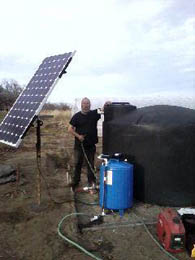
We have a lot to do, what with putting in a pad for the water tank and getting everything plumbed, but it’s very exciting. We purchased the bulk of the system from Advance Power in Calpella – they know their stuff and their prices are cheaper than Amazon (or anyone else, near as I could tell).
December 2013
The demand for water pumping coincides with the demand for air conditioning. Should there be brownouts this summer, and I suspect there will be, we will be able to irrigate independently with zero demand on the utility grid. The settling action of having a storage tank really helps with sediment, so we have cleaner water and much, much less trouble with clogged and fouled drip system components. We also have greater water pressure, so our ability to expand our drip system is enhanced. Thanks to the Community Fund, our ability to conserve and carefully distribute water is much improved.
- Snipes Family Farm & Education Center in Morrisville, PA, received a $5,000 grant to purchase fencing to add livestock onto their farm, helping to diversify the farm’s income and holdings.
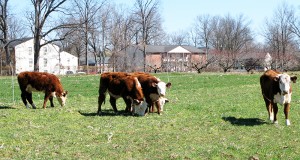
December 2013 update
We successfully ran our animal program this season. The program grew to include broiler chickens, turkeys, pigs, sheep and beef cows. Pigs grazing through last year’s brassica field cleaned up all plant debris and left manure behind for the ensuing cover crop in May 2013. This saved on fossil fuel eliminating tractor work and added manure fertility. Pigs also cleaned up an area infested with poison ivy that was encroaching on a vegetable growing field. The cows and sheep grazing cut down on fossil fuel use on the farm. We did not need to mow our pasture this season and did not mow many areas around buildings, on roadways and in the orchard where sheep grazed. Grazing animals, including the poultry, are building soil fertility, which cuts down on our need to ship in expensive compost from off the farm. Poultry also helped sanitize our orchard, which cuts back on pests and disease in the orchard the following season with less use of pesticides. School groups visiting in the spring and fall, as well as children attending summer camp, learned valuable, first-hand lessons about how their food, including meat, fruit, and vegetables, are grown. This lesson includes the importance of having fertile soil and the role the animals play in improving the soil’s fertility.
- SAGE Ag-Park in Sunol, CA, received a $3,000 grant for plantings that attract and support pollinator insects.
Want farm-fresh fruit?
We've got you covered.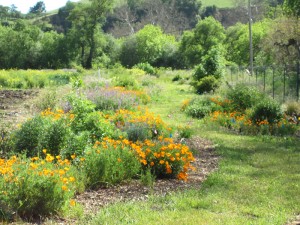
December 2013 update
We accomplished our sustainability goal by planting 300 yards (1500 sq ft) of new native plant hedgerow alongside the farmers’ fields at Sunol AgPark. Due in part to support from The FruitGuys Community Fund, this year we were able to add 300 yards to this ongoing effort, as opposed to 100 yards in previous years. This hedgerow is an environmental asset to the region, providing habitat for native and beneficial birds, insects and pollinators, as well as an asset to each of the six farmers at the AgPark, benefitting their crops and their business. The hedgerow provides significant positive sustainability outcomes both in the short- and long- term. Benefits include enhancement of the area’s natural resources and addition of visitor amenities. Short-term sustainability outcomes include increased populations of beneficial birds and insects, including native pollinators, drawn to the flowering native plants in the hedgerow. The Hedgerow Project is transforming an underutilized strip of land into a vital ecological feature of the AgPark and its surrounding watershed, providing long-term benefits to farmers and the larger community. The hedgerow helps farmers retain soil and protect water quality and reduce pesticide use through beneficial insect populations. The hedgerows will continue to provide habitat to wildlife species whose habitats might otherwise be fragmented by farm fields. This is especially important at Sunol AgPark, which is adjacent to two creeks and is near the Sunol Regional Wilderness, a popular recreational wilderness. Therefore, this hedgerow will continue to benefit the Bay Area and local communities by providing more wholesome food, protecting watershed health, and supporting wildlife and open spaces.
- Two Gander Farm in Downingtown, PA, received a $3,500 grant to expand their high tunnel, which will extend their growing season.
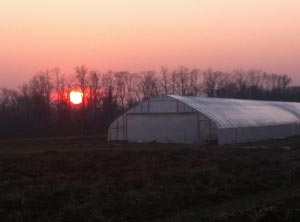
December 2013 update
Our high tunnel has already allowed us to extend the harvest of our hardy greens far beyond those in the field unprotected. This fall, we have had single-digit cold temperatures and an early snow cover that made the harvest of our field spinach impossible. December daytime temperatures have been cold enough that the field greens were either buried in the snow or the leaves were simply too frozen for harvest. We were able to instead harvest from the hoop house and fill our CSA orders with a variety of greens that were of the finest quality. Temperatures inside the hoop house at midday are high enough to work inside in just a light jacket, without the addition of a supplemental heat source. We have been able to grow turnips in the hoop house that are protected from the wind and snow and are retaining their finest quality. This has allowed us to harvest the field turnips that we would otherwise put into storage and distribute them to the Chester Co. food bank. Now that the hoop house is fully functional, we are going to be able to extend our winter marketing next season into the Philadelphia neighborhood that we serve in the summer. We are making plans to use our high tunnel for the production of summer crops, some of which we have had difficulty with disease over the past few years. The extra covered space that we now have will be put into specialty peppers that have been recently underperforming in the field.


